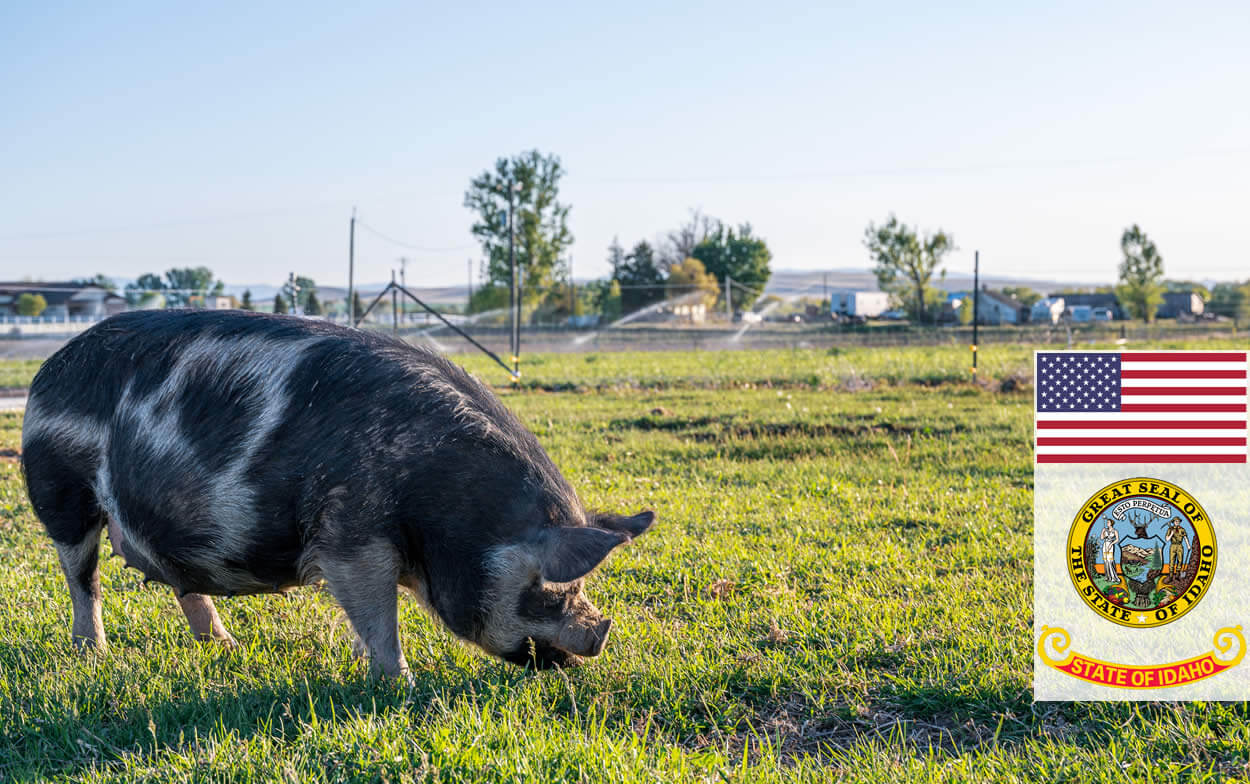
We’re continuing our series of articles about different types of pigs you can choose for your farm. This time, we’re focusing on the Idaho Pasture Pig.
Whether you’re curious about this breed or considering raising Idaho Pasture Pigs, this article provides the information you need. You’ll learn about their characteristics, lifespan, growth rate, meat quality, and the advantages and disadvantages of raising them.
Pig farming is always evolving, and the Idaho Pasture Pig breed reflects the principles of heritage preservation and environmental care. It’s a breed that helps protect older breeds and promotes sustainable farming practices.
The Idaho Pasture Pig has gained popularity among small-scale farmers and homesteaders because it’s specifically developed for pasture-based systems. It combines desirable traits from different heritage pig breeds and thrives in outdoor environments. This makes it an attractive option for sustainable and efficient pork production.
Contents
What is an Idaho pasture pig?
An Idaho Pasture Pig (IPP) is a domestic pig breed that was developed in 2006 by crossbreeding three pig breeds: the Duroc, Old Berkshire, and Kunekune pig.
This pig breed is also known as Pasture Pork, Grazing Pig, and Natural Pork. The individuals responsible for its creation are Gary and Shelly Farris from Idaho, USA, who dedicated years to perfecting this pig breed.
Gary and Shelly selected Old Berkshire and Kunekune pigs for crossbreeding due to their good temperament and ability to thrive on pasture. They also incorporated Duroc genetics to improve the meat quality and growth rate.
The result, known as the Idaho Pasture Pig, was a success. This pig is a docile and friendly breed that thrives on pasture and enjoys grazing without rooting, which helps to keep the pasture intact.
Although the development happened in 2006, the actual breeding stock of the Idaho Pasture Pig was not introduced to the market until 2012.
Idaho Pasture Pig Characteristics
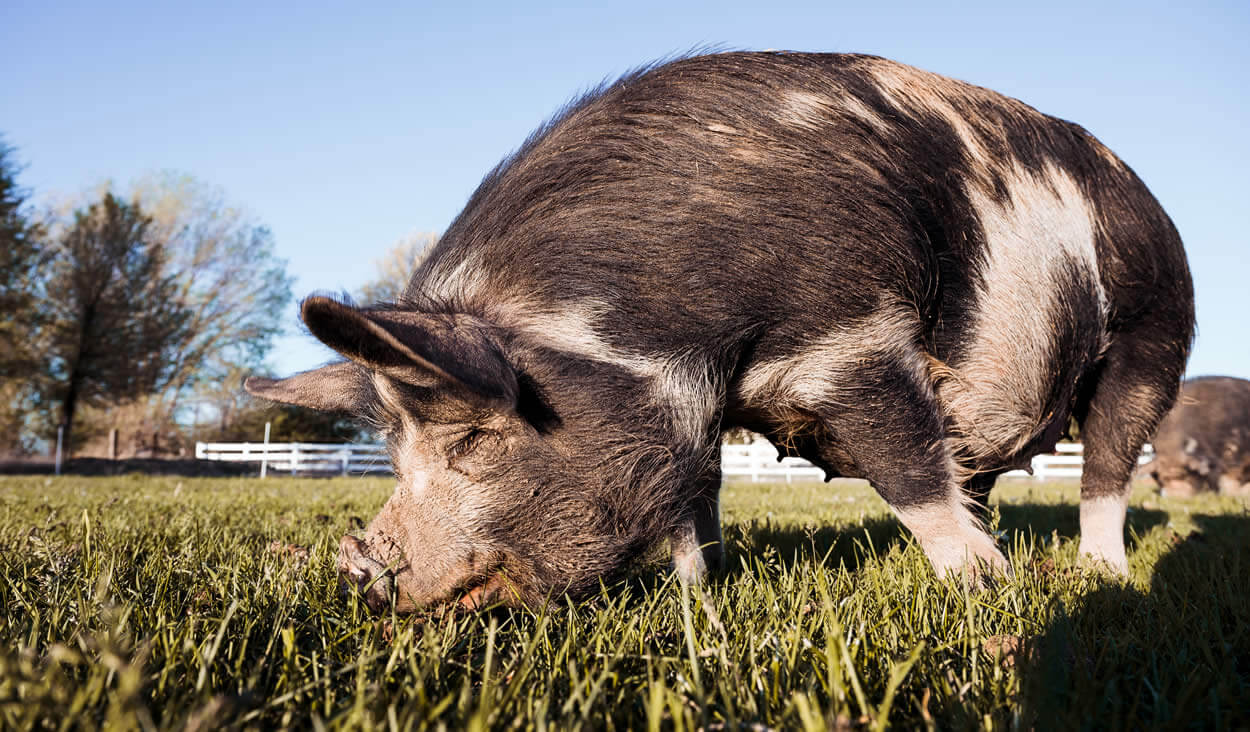
Physical Characteristics
Color
Idaho Pasture pigs come in multiple colors like black/white, ginger/black, brown/white, cream, ginger, ginger/cream, solid black, or tri-colored. Any other combination of all these colors is possible too.
As pigs age, it’s common for their coat color to fade somewhat.
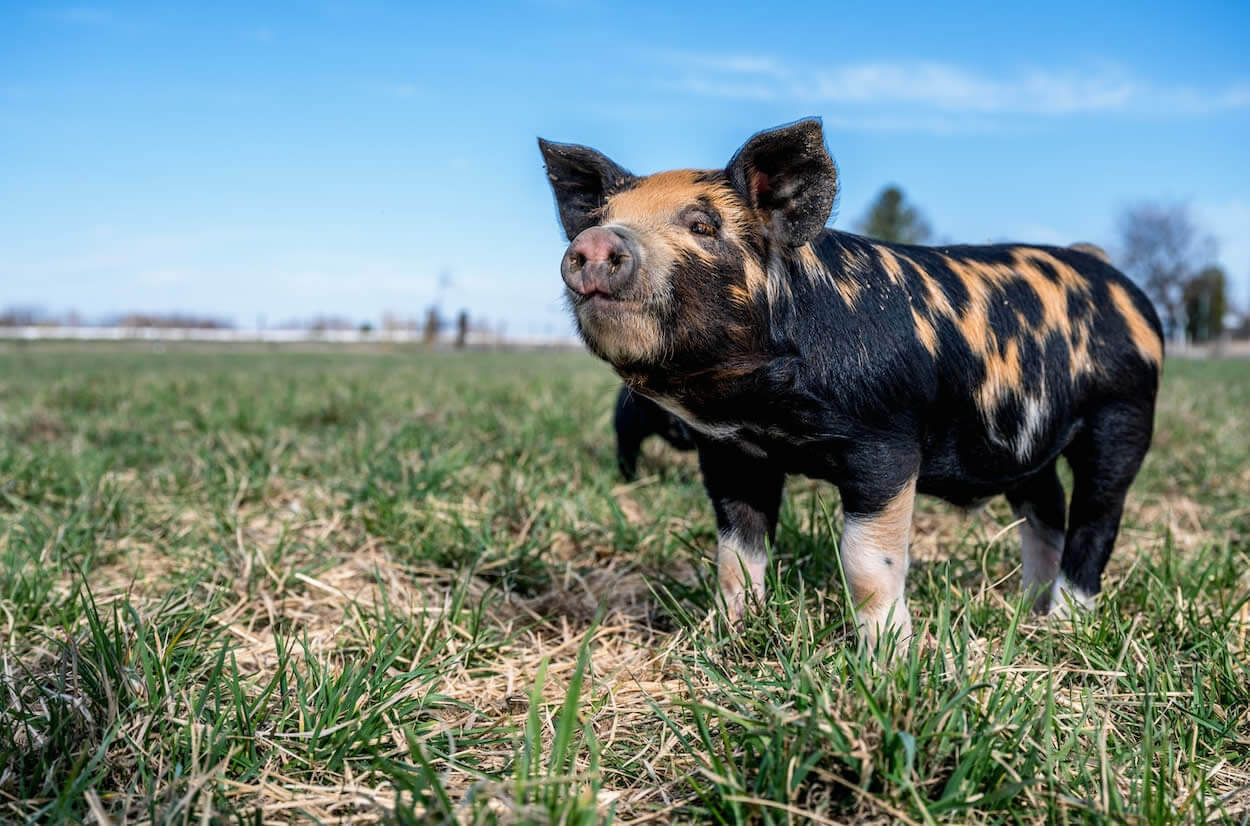
Skin
Idaho Pasture pigs have smooth and very soft skin with no wrinkles. They also have thick hair that covers their body, providing good insulation during the cold winter months and helping protect them from pests, sunburn, and insect bites in hot summer weather.
Size
The Idaho Pasture Pig is considered a medium-sized breed of pig, measuring around 36 to 38 inches in length from the tip of the snout to the base of the tail.
Head
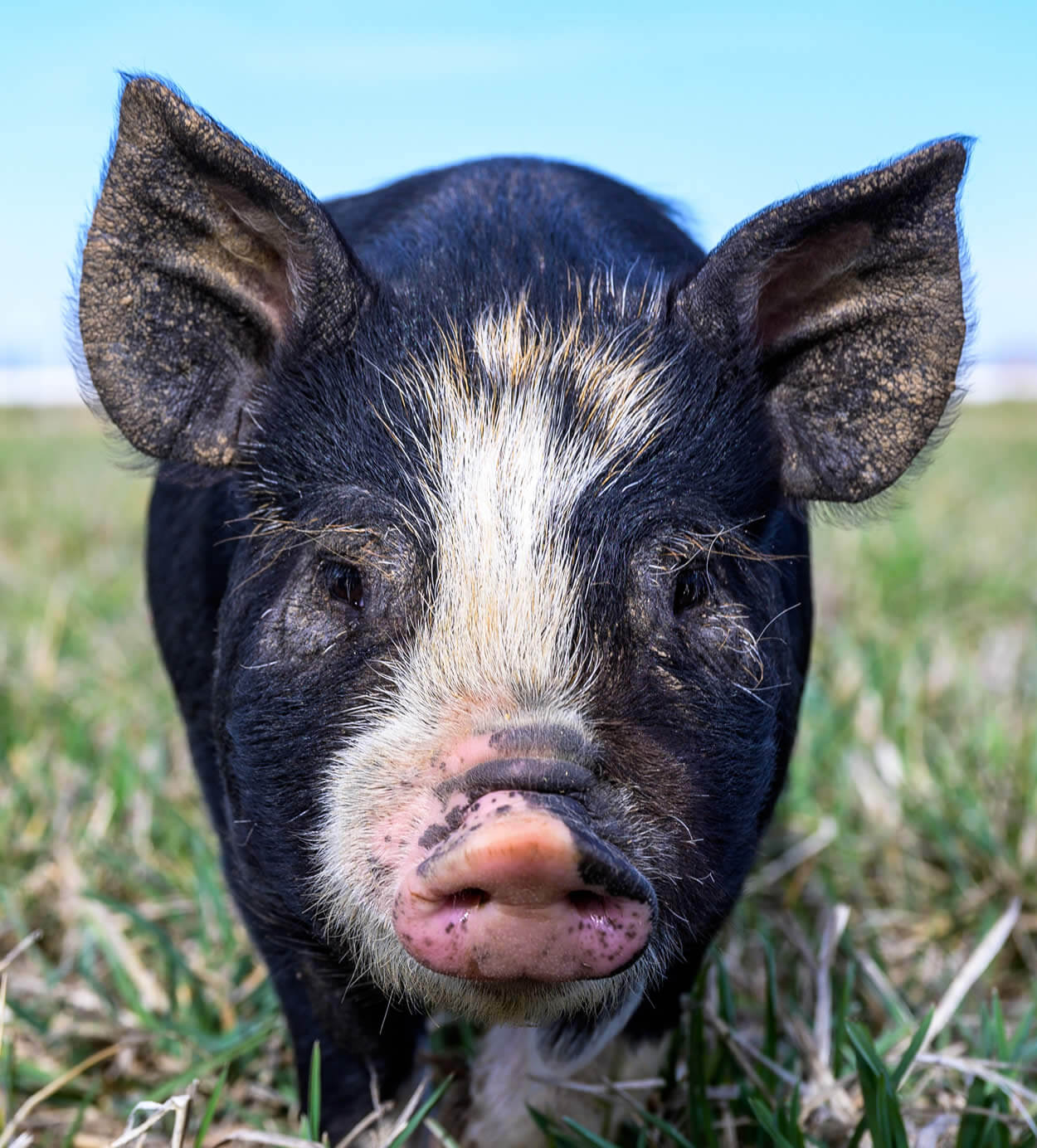
These pigs have a head proportional to their body and a slightly dished face. Their snout is of medium length and has a distinctive upturn or dish at the end.
This distinctive feature allows them to graze comfortably, but it does not allow them to root.
The snout of a pig should be considered carefully during breed selection, as it should be wide and well-suited to the overall head shape, without any tapering, elongation, snubbing, or dishing, which would disqualify the pig from consideration.
Body
The Idaho Pasture Pig has a rectangular-shaped body with a muscular frame. It features a deep chest, a long straight back, and a high tail set, giving it a unique appearance.
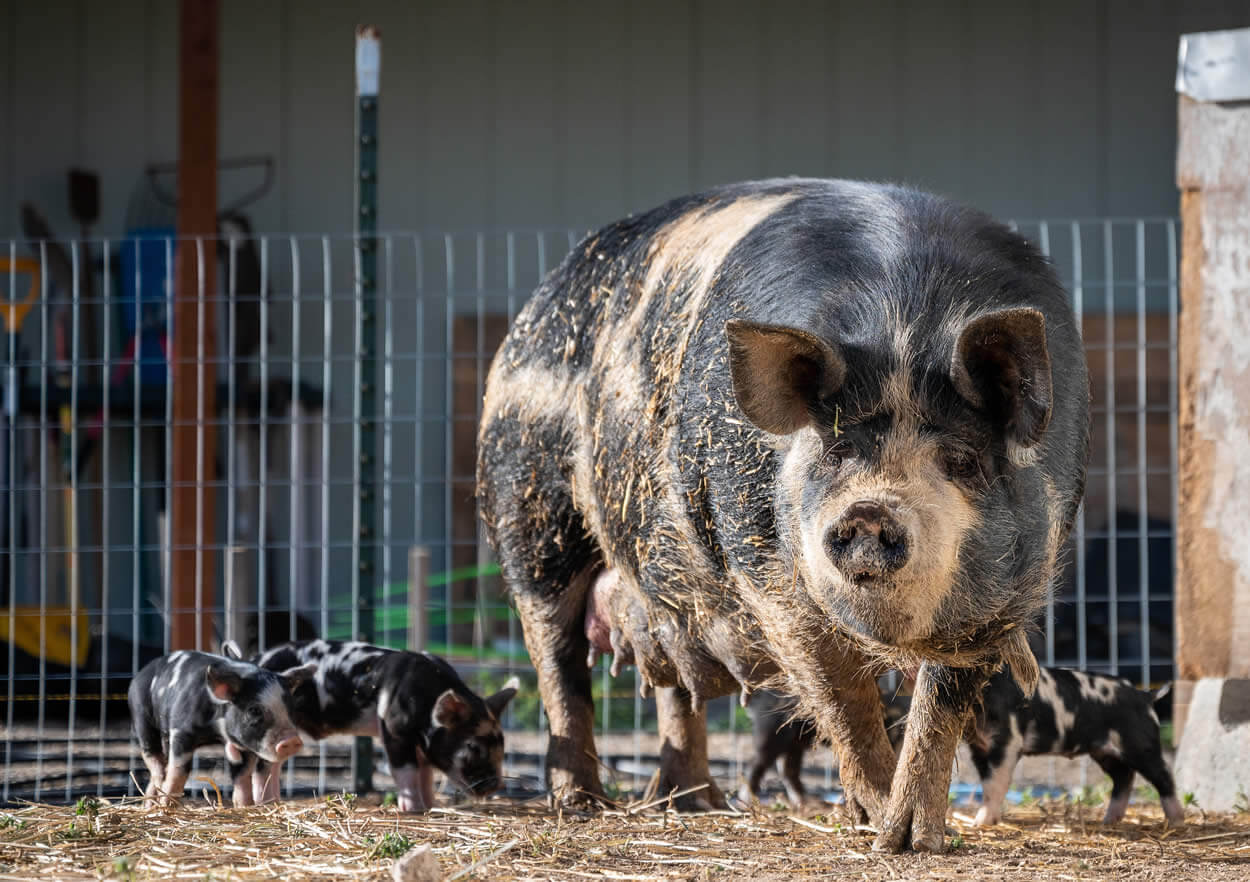
Shoulders
The shoulders of the Idaho Pasture Pig are also muscular and in direct proportion to the rest of the body.
A distinguishing feature of these pigs is that the shoulders of boars are more pronounced than those of sows, making it easier to differentiate between the sexes.
In boars, the shield, which is a layer of fat and muscle around their neck and shoulders, begins to develop around 2 years of age.
Ears
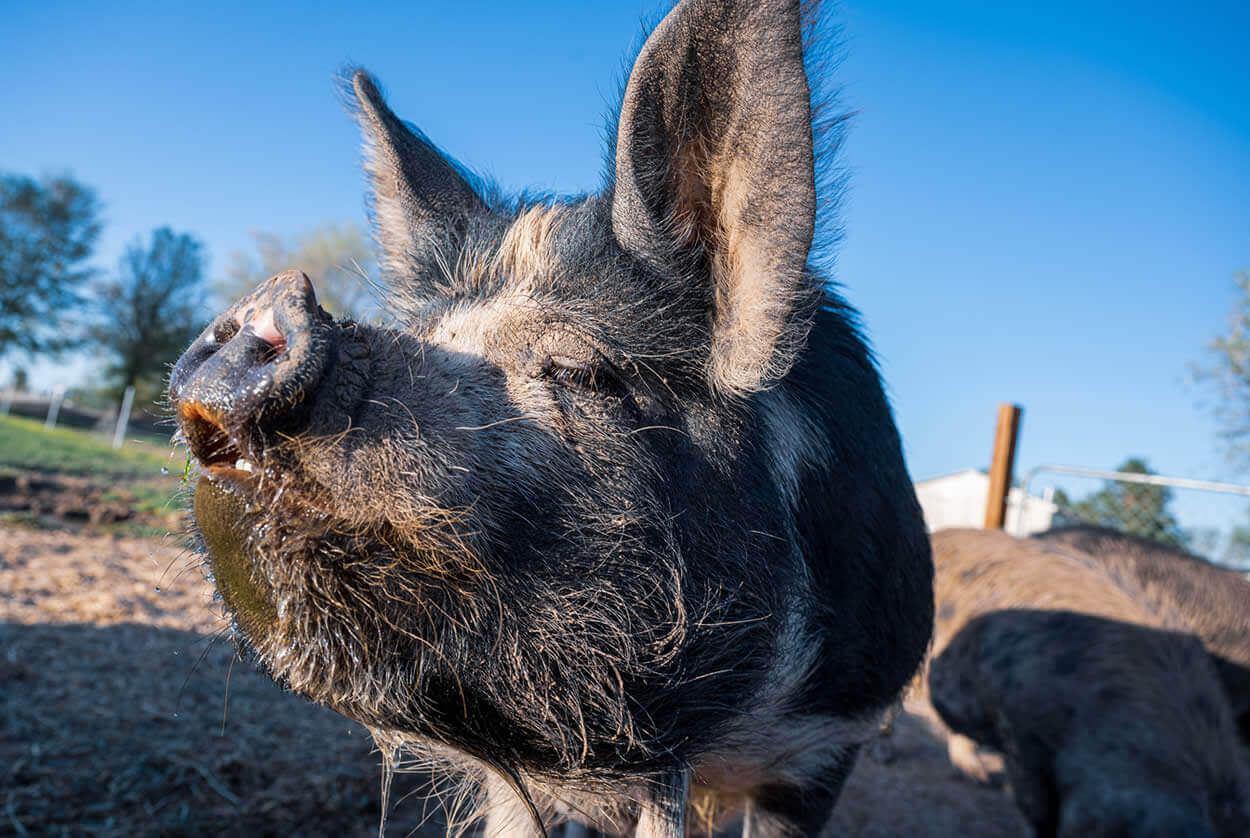
The ears of the Idaho Pasture pig are medium-sized, slightly curved forward, and erect. While some pigs may have drooping ears, those with erect ears are preferred.
Legs
The legs of the Idaho Pasture Pig are muscular and have a strong bone structure. They come straight down from the body. Also, to ensure easy movement, the legs of this breed are supple while being positioned squarely under the body for optimal balance.
Lifespan
The Idaho Pasture pig is a relatively new breed and its exact lifespan is not yet defined. Some experts suggest that Idaho Pasture pigs have a lifespan ranging from 8 to 10 years.
Growth Rate
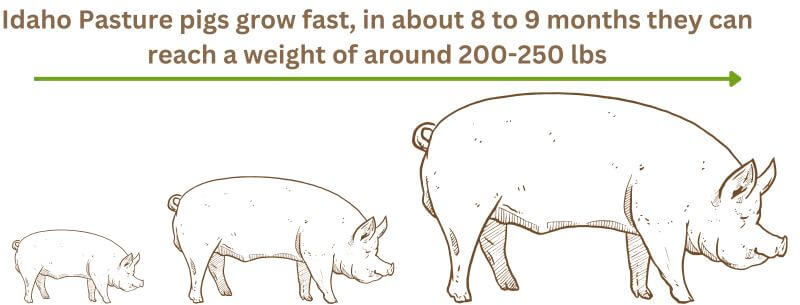
How fast do Idaho Pasture pigs grow?
Idaho Pasture pigs grow fast in about 8 to 9 months.
With good conditions and proper nutrition, Idaho Pasture pigs have a relatively fast growth rate compared to some other heritage pig breeds, such as the Mangalitsa pig.
This rapid growth rate is one of the characteristics that makes the Idaho Pasture a popular pig breed among small farmers and homesteaders.
Weight
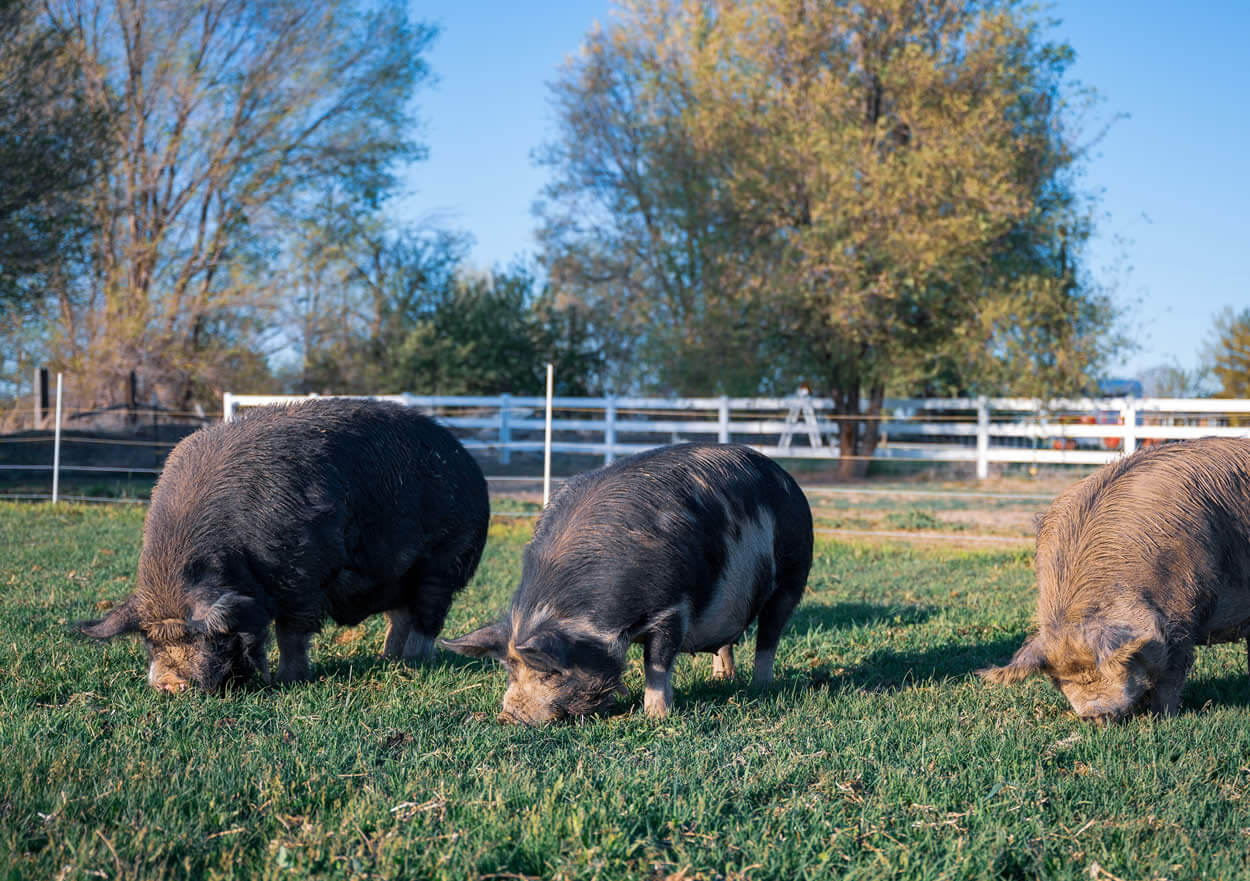
Idaho Pasture pigs can reach a mature weight of around 250-300 lbs for sows and 350-400 lbs for boars.
The weight of these pigs can vary depending on genetics, diet, and environmental factors, but the average is around the number above.
Below, in Table 1 you can find an Idaho Pasture pig size chart with average growth rates. Keep in mind that this is an average, and variations can exist due to factors like location, diet, genetics, and time of year.
| Growth Stage | Lbs |
|---|---|
| 4 weeks | 15-20 Lbs |
| 4-6 weeks | 20-30 Lbs |
| 3-4 months | 50-80 Lbs |
| 5-6 months | 100-130 Lbs |
| 6-7 months | 150-170 Lbs |
| 9-10 months | 225-275 Lbs |
Slaughter Time
Idaho Pasture pigs can typically be slaughtered when they reach around 8 to 9 months of age and reach the desired hanging weight.
For Idaho Pasture pigs, the typical hanging weight is around 230 lbs.
Temperament and Behaviour
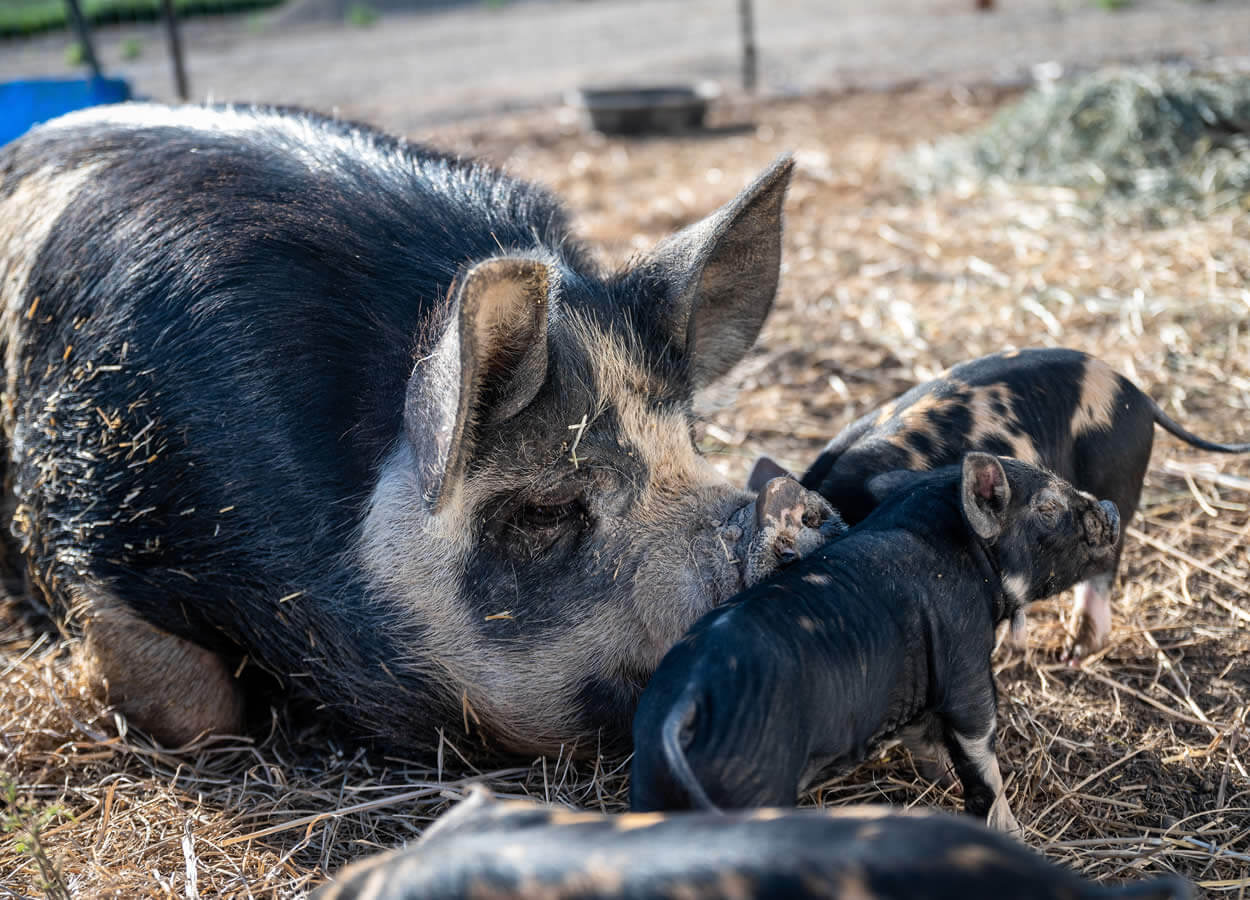
Idaho Pasture pigs are known for their calm and docile temperament, which is inherited from the Kunekune pig genetics.
Their friendly personality is such a strong breed standard that if an Idaho Pasture pig displays aggression, it is not recognized as one according to the IPPA standard. An aggressive pig should be culled as it does not meet the breed standard for disposition.
These pigs love being outdoors, especially in pasture areas where they can graze rather than root. They are curious, playful, and generally safe to be around. They enjoy socializing, and breeders should practice socializing with them from the piglet stage.
Human interaction can make these already calm pigs even more manageable and may even create affection toward the person who feeds them.
Idaho Pasture pigs have the ability to form a unique bond with their caretakers and even react with enthusiasm when they hear their voices.
This is a testament to their intelligence and social nature and makes working with them an absolute delight.
Both Idaho Pasture boars and sows are good-natured pigs, and the sow is not aggressive, even when grazing outside with her piglets. However, the sow may become protective if the piglets start squealing.
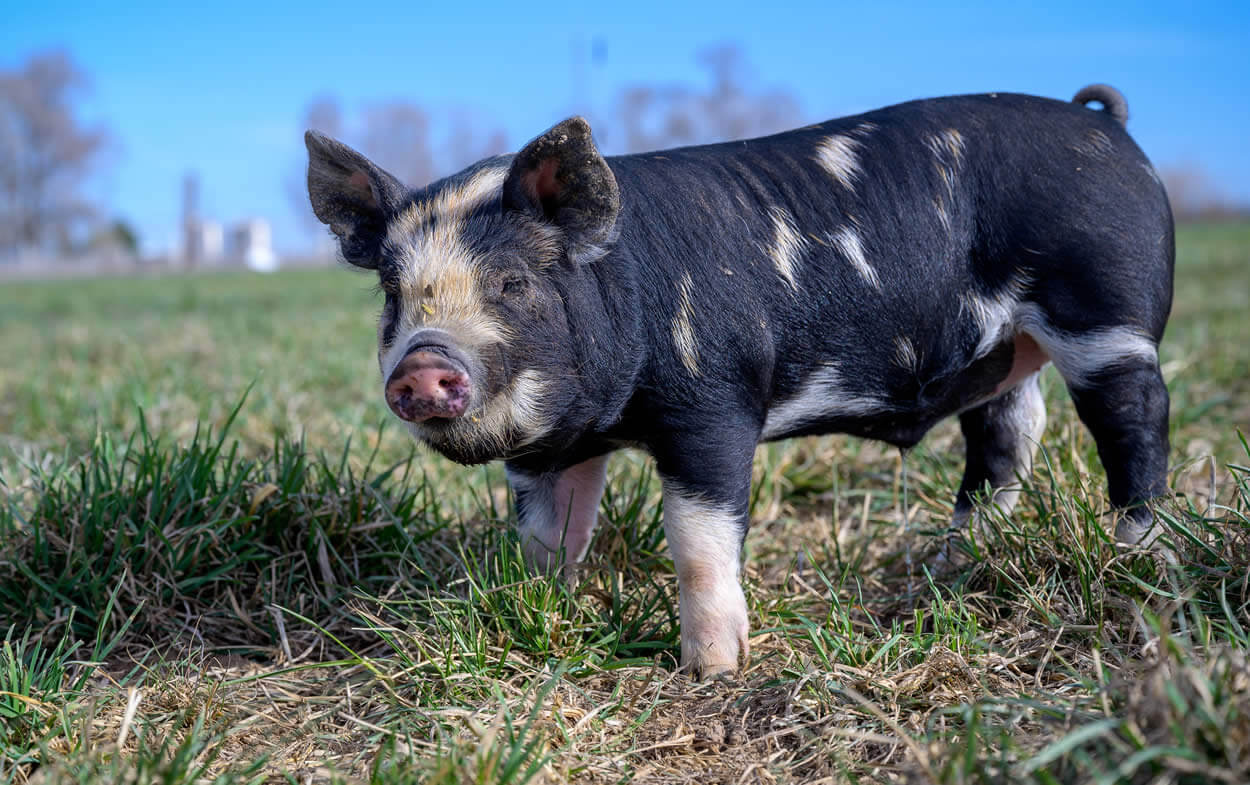
Overall, their docile temperament makes them perfect pigs for beginner farmers with no experience in raising pigs.
Meat
The Idaho Pasture pig meat is definitely different from others in terms of texture, color, and taste, being mostly lean with a well-balanced quantity of fat.
The exact percentage of lean and fat can vary from cut to cut, but overall, these pigs have a higher percentage of lean meat than fat. Although there aren’t many studies on this, you can expect the lean meat to be around 75% and the fat to be around 25%.
The color of Idaho Pasture pig meat is deep red due to their grass-based diet. This diet also gives the meat a sweeter flavor and a well-marbled texture with extremely buttery fat.
The Idaho Pasture pig meat is an excellent source of vitamins and minerals, including niacin, vitamin B6, vitamin B12, zinc, phosphorus, thiamine, vitamin E, and omega-3 fatty acids. These pigs are known for having higher levels of vitamin E and omega-3 fatty acids than other traditional pig breeds. Overall, the Idaho Pasture pig meat quality is excellent due to its high nutrient content.
But how much meat do you get from Idaho pasture pigs?
The amount of meat you get from an Idaho Pasture pig can vary based on factors like the pig’s size, the cuts you choose, and the processing method, but you can generally expect to get around 150 lbs of cut and wrapped meat from a 200 lb hanging weight.
| Nutrient | Amount per 3.5 ounces (100 grams) |
|---|---|
| Calories | 250 calories |
| Protein | 24 grams |
| Fat | 17 grams |
| Saturated Fat | 6 grams |
| Cholesterol | 74 milligrams |
| Iron | 1.1 milligrams |
| Zinc | 2.2 milligrams |
| Vitamin B12 | 0.8 micrograms |
| Omega-3 Fatty Acids | 0.1 grams |
Please note that these values are approximate and may vary depending on the specific cut of meat and the animal’s diet and living conditions.
Growing Idaho Pasture Pig
Feeding
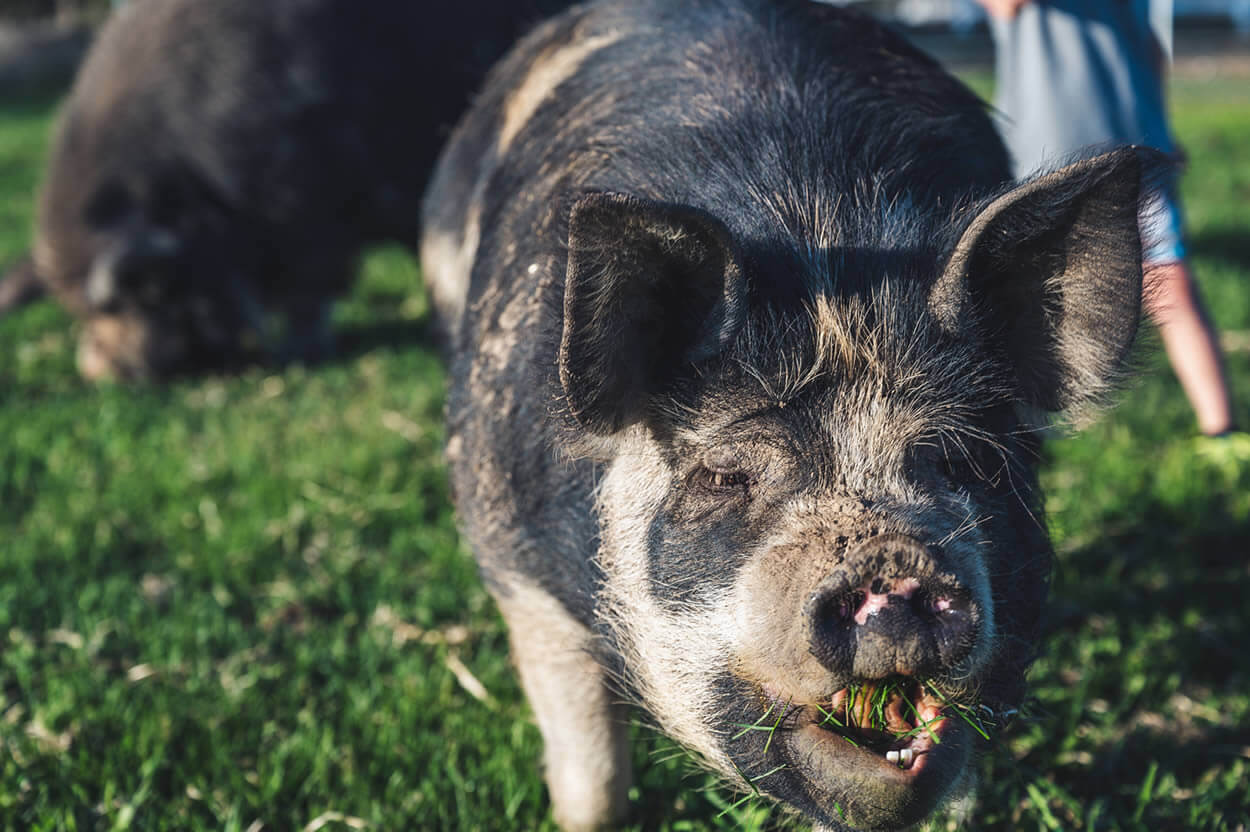
While Idaho Pasture pigs are great grazers, they require supplementary food to meet their nutritional needs and thrive.
Though they don’t require intensive care, they still need a rich diet to be fed. Including grains in their diet is crucial to ensure their digestive systems work properly and they get the right nutrients.
When it comes to plants, alfalfa, clover, and various grasses are great options to have on the pasture. If they’re allowed to graze on these, grain consumption can be reduced.
Alfalfa is the best feed for Idaho Pasture pigs as it’s a great source of dietary fiber, vitamins, minerals, selenium, vitamin E, and protein.
Other grasses that are suitable include orchard, brome, fescue, and timothy mixed with legumes.
I would recommend testing your soil as well. This can indicate whether your soil has enough vitamins and minerals for your Idaho Pasture pigs. If your soil does not meet its nutritional needs, you will need to supplement its food with the missing nutrients.
In addition to hay and grains, fresh vegetables, raw milk, boiled eggs, pumpkins, and apples can be added to their diet.
It is recommended to also add minerals to their feed.
When raising Idaho Pasture piglets, you can use free-choice pallets. At 5-6 weeks old, each piglet can be given 1 lb of feed per day (split between morning and evening). This can be increased to 3 lbs per day at 4 months old, 3.5 lbs per day at 6 months, and 7 lbs per day at 7 months.
It’s recommended to soak their feed in water to reduce dust, make it easier to eat, and ensure they feel fuller and stay hydrated.
One of the routines you can use to soak their feed is to prepare their dinner in the morning and let it soak for around 10 hours until the evening. Then, prepare their breakfast in the evening for the next day, which will have approximately 14-15 hours of soaking.
What not to feed
It is important to avoid feeding Idaho Pasture pigs any moldy food or compost containing forbidden old food as it can cause digestive issues and upset their stomach.
As Idaho pasture pigs are particularly sensitive to salt, it’s important to not give them any compost or food that may contain excessive salt levels. Therefore, it’s recommended to be cautious about what you add to their feed.
Water Intake
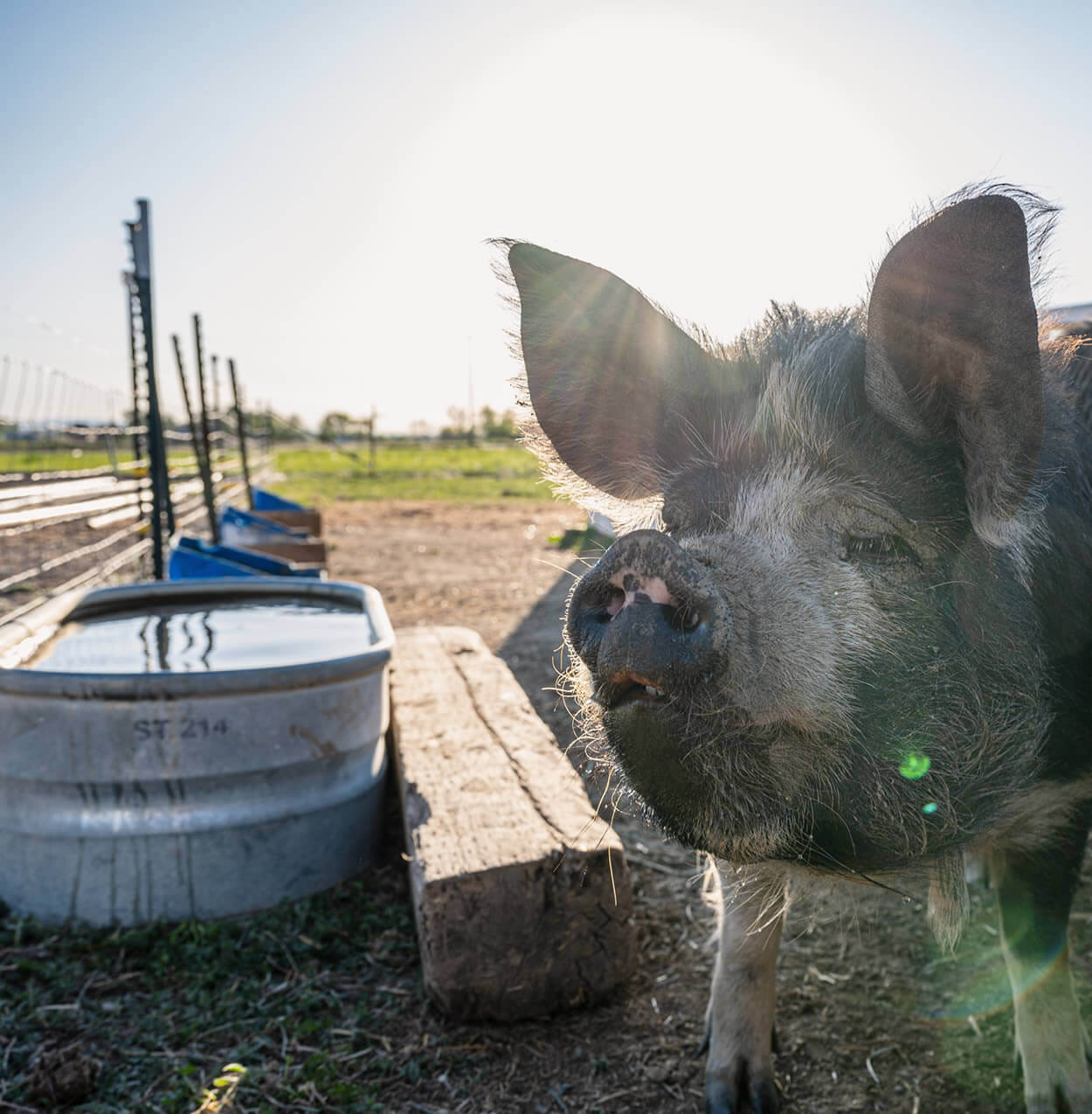
To grow healthily, Idaho Pasture pigs require access to a reliable source of fresh water, as do all other pig breeds. A consistent supply of water is critical for pig farming, whether on a small homestead or a larger operation.
Environment
Idaho Pasture pigs are grazers and must be raised in a free environment with unrestricted access to a pasture area. It’s important to allow them to graze all day long. You have to keep in mind that Idaho Pasture pigs do not root.
These pigs cannot be raised indoors, let alone in commercial pig farms. They thrive best on small to medium farms or homesteads with enough pasture for them. As long as they have sufficient space to graze and explore, these pigs grow without any issues.
To keep them contained, you can use an electric fence. From the start, they will learn to respect it and stay within the limited area.
Additionally, you can rotate their grazing area if you have enough space to do so. In this way, they will graze on new soils, and their manure will help fertilize the pasture.
Did you know that Idaho Pasture pigs produce manure with no offensive smell? Due to their grass-rich diet, their manure has almost no odor, and it’s an excellent natural fertilizer for the soil.
Climate
Idaho Pasture pigs are known for their ability to thrive in a variety of climates, including both warm and cold temperatures. However, they are best suited to temperate climates with mild summers and winters, as they are outdoor animals and grazers by nature.
In warm weather, it is particularly important to provide them with access to a wallowed and shaded area. As pigs do not sweat, the wallow helps them regulate their body temperature and stay cool.
Shelter
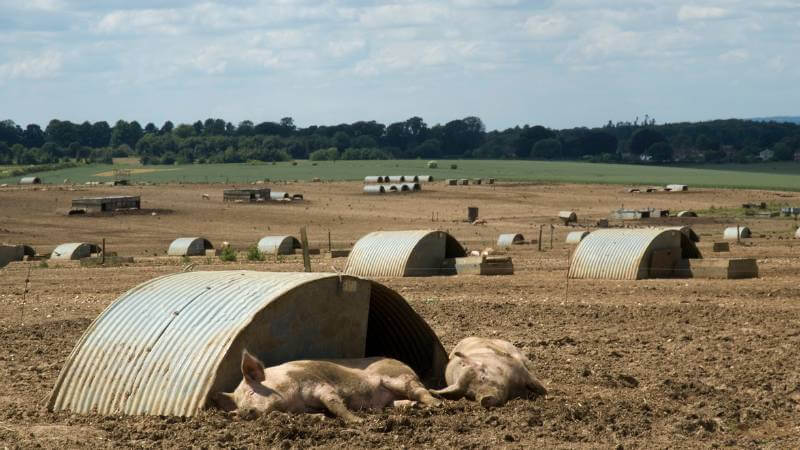
Idaho Pasture pigs need more than just an electric fence for their protection. They also require a shelter that can keep them safe from extreme weather conditions, and predators, and provide them with a comfortable place to rest.
Extreme weather conditions such as intense heat, cold, strong winds, and rain can harm pigs, affecting their well-being. Thus, a shelter provides a safe and healthy environment, protecting them from these harsh weather conditions.
Predators like coyotes, wolves, and bears are also a threat to Idaho pasture pigs. In case of an attack, the pigs can retreat into their shelter where they will be protected from predators.
Additionally, a shelter provides a clean and dry environment, reducing the risk of diseases and infections caused by muddy terrain or wallows.
What kind of shelter is suitable for Idaho Pasture pigs? The ideal shelter for Idaho pasture pigs is an A-frame shelter. When they enter the shelter, their back touches the frame and they lay down. As for the bedding, you can use straws. Straws can provide loft and warmth during colder months and farrowing.
How many Idaho Pasture pigs per acre?
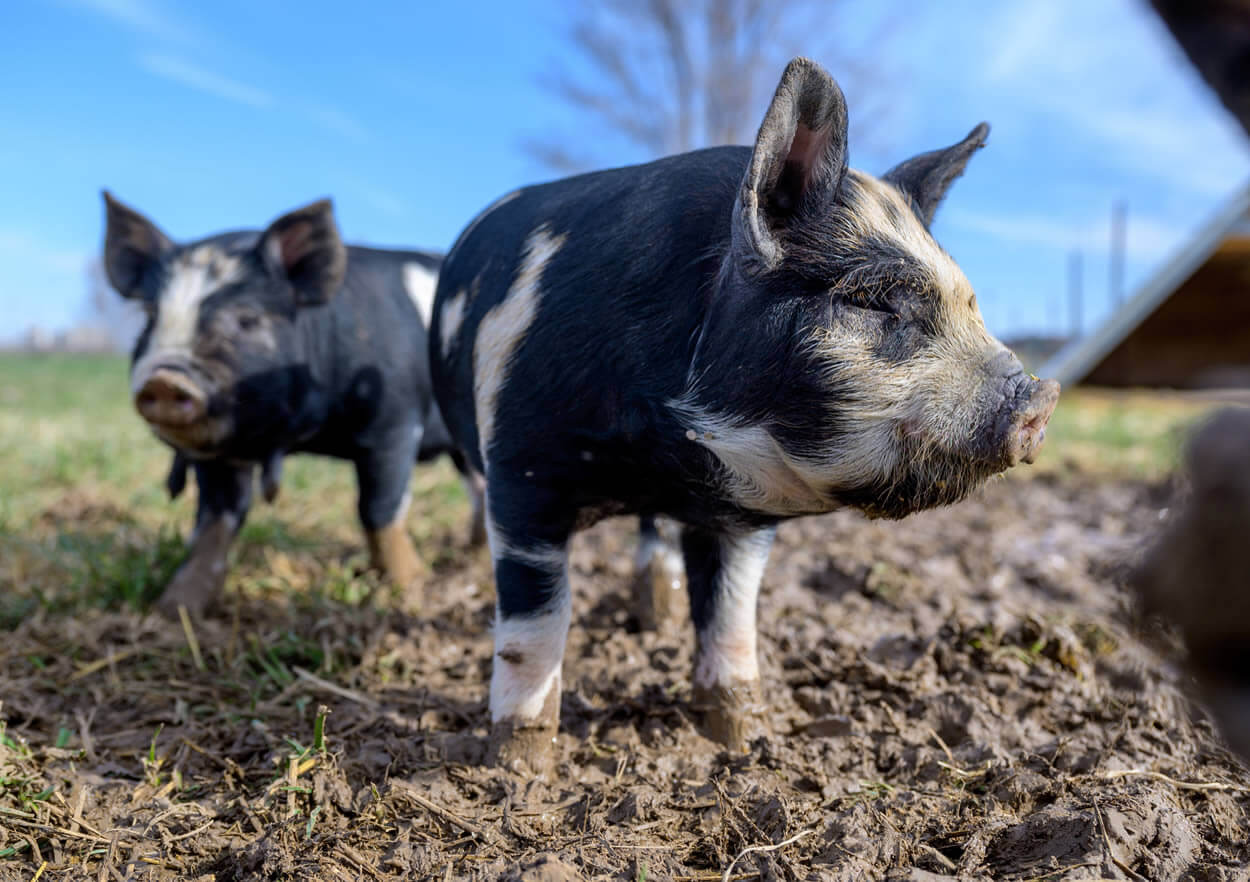
According to the Idaho Pasture Pig Registry website, you can raise up to 10 adult Idaho Pasture pigs per acre.
You also have to consider that the exact number of pigs that you can raise per acre depends on factors such as the quality of pasture and soil, as well as the size of the pigs.
Breeding Idaho Pasture pigs
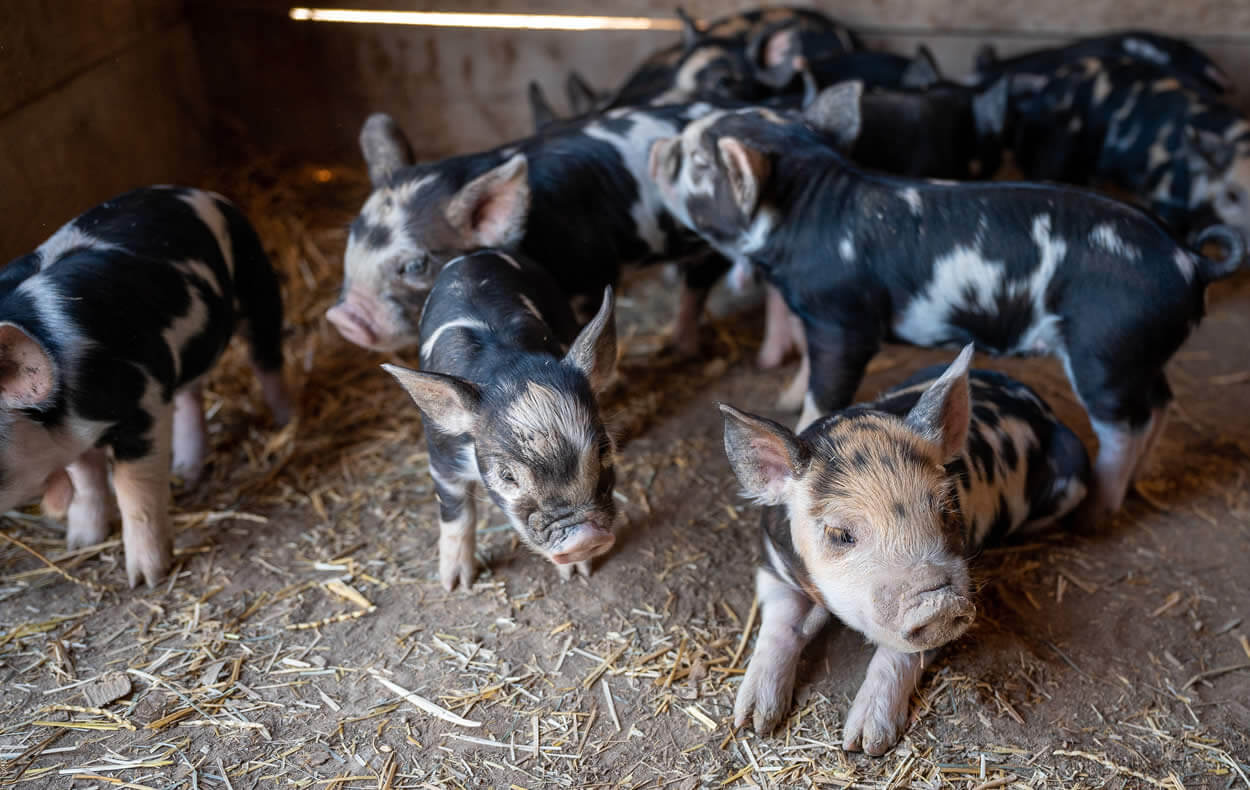
Idaho Pasture Pigs can be bred on small farms and homesteads.
Before sliding into how you can make the breeding happen, here are some key facts about breeding the Idaho Pasture pigs:
– Idaho Pasture Pigs can be bred as early as 7-8 months old, although this may vary slightly depending on the specific bloodline.
– Female pigs go into heat every 21 days, making them potentially capable of becoming pregnant every three weeks. However, it is important to allow them to have a rest period between pregnancies to ensure their body recovers and their health is not affected.
– The gestation period for Idaho Pasture Pigs is 3 months, 3 weeks, and 3 days.
– The Idaho Pasture pig litter size is between 8 to 10 piglets.
– Idaho Pasture sows are excellent mothers, exhibiting strong mothering skills and caring for their piglets very well.
When it comes to breeding Idaho Pasture pigs, there are two methods you can use: natural mating or artificial insemination. Here are some key points to help you decide which method is right for you:
Natural mating
This is the easiest method and requires no additional tools. If you have a male pig with intact testicles or a large enough boar, you can simply place them together with a female pig and allow them to mate. The male pig will figure out the best time to mate when the female pig is in heat.
Idaho Pasture pigs artificial insemination
If you do not have a male pig with intact testicles or a large enough boar, you can use artificial insemination. This method requires some additional tools and your active involvement.
To identify when the female pig is in heat, watch for the following signs:
– Swollen vulva and milky discharge
– More aggressive behavior
– Climbing on other pigs
To perform artificial insemination, you will need the following tools:
– Insemination rod: There are different types to choose from: spiral ones or the ones with foam end.
– Boar semen: This can be acquired from breeders.
– Boar spray: This is a pheromone spray used to induce standing heat in the female pig.
Once you have all the necessary tools and your female pig is in heat, you can start the artificial insemination process.
Here are the steps to follow:
- First spray the bore spray or bore pheromone onto the sow’s snout. You should notice the sow calming down and standing still.
- Gently insert the insemination rod into the sow’s vaginal canal, being careful not to cause any discomfort or injury. Once inserted, angle the rod upward towards the spinal area.
- Attach the bore semen to the rod and slowly squeeze the container to deposit the semen. Take your time with this step to ensure proper distribution of the semen.
- Once all the semen has been deposited, gently remove the insemination rod from the sow’s vulva.
- Finally, monitor the sow’s pregnancy status in the coming weeks to ensure successful insemination.
Idaho Pasture pig health issues
Idaho Pasture pigs may experience some health issues throughout their lives. Here are some common health issues that these pigs can develop:
– Obesity: Idaho Pasture pigs tend to gain weight quickly and become overweight. Try not to overfeed them. Obesity can cause heart issues and joint problems, so it is important to be mindful of their diet.
– Digestive issues: These pigs are sensitive to their stomachs and should not consume moldy or salty food as it can lead to diarrhea, constipation, and lethargy.
– Respiratory issues: Due to their short snouts with an upward end, Idaho Pasture pigs are sometimes prone to respiratory issues such as pneumonia. To minimize the risk, ensure their living area is clean and dry.
Additional Tips
– Idaho Pasture pigs thrive only outdoors in an area rich in vegetation that allows them to explore and graze all day long. This also allows them to exercise, which results in tender and firm meat.
– Provide them with a wallow to have fun and cool themselves.
– Rotate the pastures to minimize the incidence of parasites in these pigs.
– If possible, plant alfalfa on your pasture as it is an excellent source of dietary fiber, minerals like selenium, and vitamin E.
– Make sure your pigs do not have a selenium deficiency. Most land is not high in nutrients and vitamins, so it is crucial to take the right approach to maintaining their selenium levels.
– Do not feed them salt. Excessive intake of salt can lead to salt toxicity in Idaho Pasture pigs, which can result in severe illness and even death.
– Ensure that the pigs have access to fresh water at all times.
– Always monitor their health. If they show signs of illness or injury, seek the help of a vet.
– Clean their living area regularly to reduce the risk of diseases.
Why should you raise it?
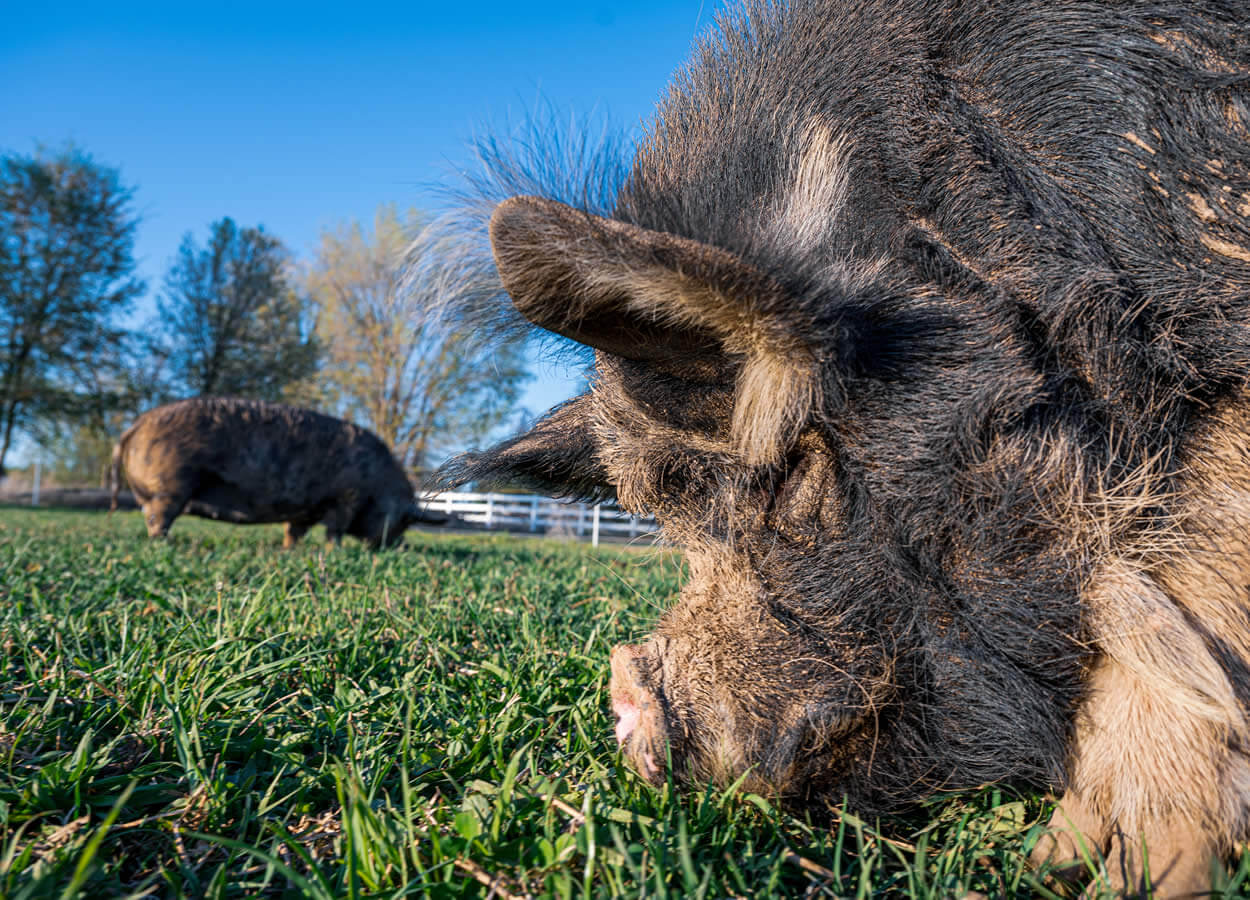
Profitability
Idaho Pasture pig breed can be a profitable business only for those who are registered as Idaho Pasture pigs breeders and have the necessary certifications for their pigs.
As a registered breeder, you have the opportunity to sell sow, boars, and Idaho Pasture piglets to other farmers and breeders.
The market price for registered Idaho Pasture piglets typically ranges from $500 to $600, while a registered pig can fetch up to $800. A mature boar and sow of Idaho Pasture pig breed can go up to $2000.
If you are not a registered Idaho Pasture pig breeder, the value of your pigs may drop significantly to only $100 to $150, making it difficult to turn a profit.
Therefore, it is essential to register your pigs and become a certified breeder to maximize your earnings potential.
But what about the price of Idaho Pasture pig meat? The average price for Idaho Pasture pork is around $7 to $9 per pound depending on the breeder, the location, and the cut of meat.
Personal Use
Raising Idaho Pasture pigs on your homestead or small farm can be an excellent way to produce high-quality meat.
Idaho Pasture pig meat is rich in essential nutrients and vitamins like omega-3 fatty acids, and vitamin E, and it is also known for its exceptional flavor and tenderness.
Because these pigs are independent and self-sufficient, they require minimal attention from you. All you need to do is provide them with a suitable outdoor area for grazing and living, shelter, and supplemental feed.
Idaho Pasture pigs are known for their friendly and calm demeanor, making them a great addition to any farm. They are easy to care for, making them an ideal choice for busy homesteaders or small-scale farmers.
In addition to producing high-quality meat, Idaho Pasture pigs can also be used to fertilize your fields. Their manure is mostly
Advantages and Disadvantages
The Idaho Pasture Pig offers several advantages for farmers, but there are also some disadvantages to consider.
| Advantages | Disadvantages |
|---|---|
| Excellent grazers | They can become overweight if overfed |
| They feed on grass and require grains only as a supplement, resulting in lower costs | They require ample space to graze |
| High-quality meat with a high content of vitamins and minerals | They are more expensive than other commercial pig breeds |
| Hardy and adaptable to both warm and cold environments | Not suitable for large-scale farming operations |
| Friendly and calm temperament | They grow slower than commercial pig breeds |
| Thrive on pasture-based systems | They have a sensitive stomach and require special care when feeding |
| They have a good average litter size | |
| The sows have great mothering skills |
It’s important for farmers to consider these advantages and disadvantages when deciding whether the Idaho Pasture Pig is suitable for their specific farming operations and goals.
How to buy an Idaho Pasture pig
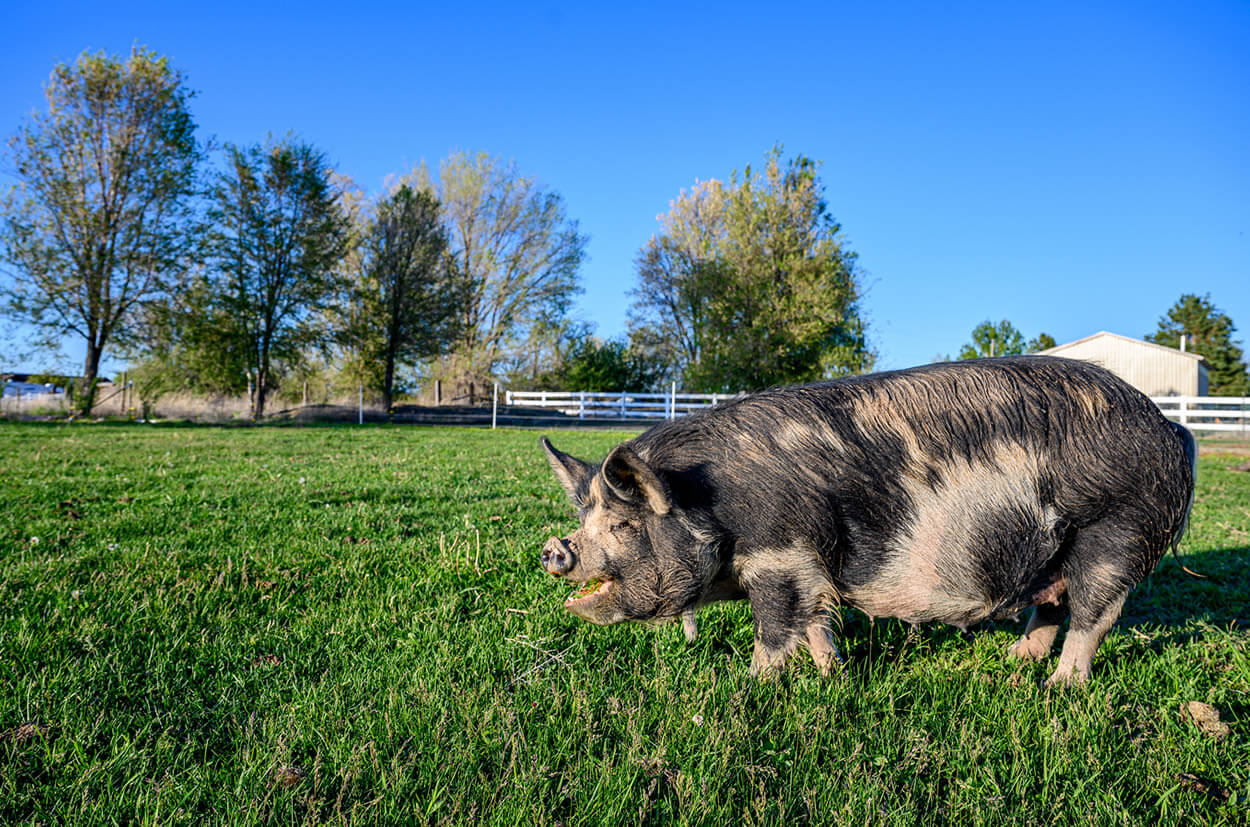
If you want to ensure that you are buying a genuine Idaho Pasture pig, the first step is to purchase your pig or piglet from a certified Idaho Pasture pig breeder.
You can contact the breeder and ask questions about their breeding program.
There are 25 registered sow lines and 12 registered boar lines, including Pepper, New Moon, Candy, Grace, Hope, Love Pig, Diana, Heart, Jewel, Destiny, Fate, Ida, Maple, Jingle, Sparkle, Snowflake, Autumn, Raven, Jodi, Shelly, Chris, Kelly, Petunia, Black Gold, and Red Rock for sows, and Bandit, Max, Rex, Triton, George, Sam, Snickers, Wendell, Atlas, Dave, Oreo, and Gary for boars.
It is essential to verify the certification proof of the pig that the breeder used. This is crucial because you cannot certify the pig after buying it from the breeder. Additionally, make sure the pig is healthy, active, and has a good physique.
If you plan to breed these pigs, it is recommended to buy them from different locations to reduce the risk of being related to each other.
Pig Registration
To ensure that you have genuine Idaho Pasture Pigs, it is important to purchase them from registered breeders. These registered pigs must meet specific physical characteristics and have a calm temperament. Registration is typically done by the breeder and ensures that the pigs are indeed purebred Idaho Pasture Pigs.
It is important to note that if you want to purchase a pig from an unregistered breeder or individual, you will not be able to register the pig or piglet as an Idaho Pasture Pig after that.
Therefore, be sure to do your research and only purchase from reputable breeders that registered their pigs as true Idaho pasture pigs.
Bibliography & Sources:
– IDAHO PASTURE PIG BREED ASSOCIATION / idahopasturepig.org
– We want to thank Brett Sayles for providing some of the pictures.


I,d like to buy a pair , or trio of reg. Ipp. , In ga. ? , And would want cert. Info and results , unsure of reg. Reputable breeders in ga, thanks Richard
Hi Richard,
Thank you for contacting us.
I would like to inform you that we do not sell Idaho Pasture Pigs. This article is provided for informational purposes to assist farmers interested in raising and breeding this particular pig breed.
If there’s anything else I can assist you with, please don’t hesitate to let me know.